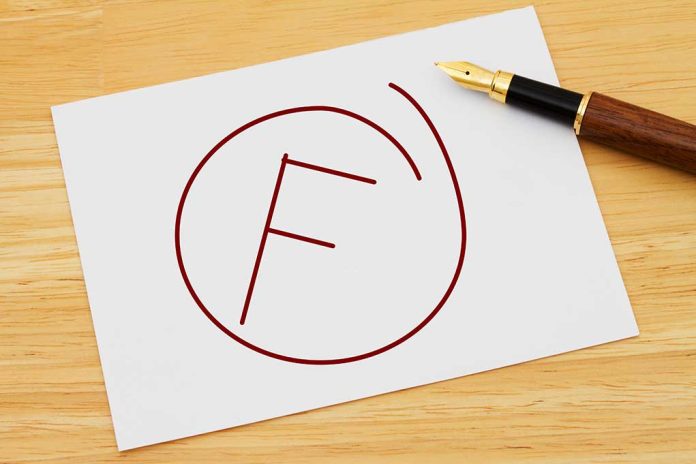
A fifth-grade student’s expulsion from an elite Los Angeles private school over rap lyrics and emojis sparks legal battle and debates on school policies.
At a Glance
- Fifth-grader expelled from Curtis School for emailing rap lyrics and squirt gun emojis
- Parents sue school, claiming expulsion was arbitrary and without policy violation
- Lawsuit seeks reversal of expulsion and compensation for legal fees
- Case raises questions about school disciplinary practices and policy transparency
Controversial Expulsion Sparks Legal Action
A prestigious private school in Los Angeles finds itself at the center of a legal storm after expelling a fifth-grade student for emailing rap lyrics and squirt gun emojis to a classmate. The parents of the expelled student have filed a lawsuit against Curtis School and its director, Meera Ratnesar, challenging the decision and seeking to have their son reinstated.
The case has ignited a debate about school disciplinary practices, the interpretation of student communications, and the balance between maintaining a safe learning environment and respecting students’ rights. Curtis School, known for its $28,760 annual tuition and celebrity clientele, now faces scrutiny over its handling of the situation.
The parents of a student at the elite Curtis School in Los Angeles is suing the school and its director after the 5th grader was expelled over an email with another student that included squirt gun emojis and rap lyrics. https://t.co/Wo8OOz4Ecx
— FOX 11 Los Angeles (@FOXLA) October 22, 2024
Details of the Controversial Exchange
The incident in question revolves around an email exchange between the expelled student and a classmate. The emails included lyrics from rapper YNW Melly’s song “Murder on My Mind” and the use of squirt gun emojis. In one message, the expelled student wrote “You dead yet,” to which his classmate responded “No y.” The exchange also included phrases like “Shut up” and “I hate you,” accompanied by squirt gun emojis.
“The emails between the two friends do not appear to violate any student conduct rule and the squirt gun emoji is available on the Curtis School’s IT system that is used by the students, On information and belief, Respondent Ratnesar did not impose any similar discipline on Petitioner’s friend, nor was his friend barred from campus nor expelled. Respondents’ final decision to expel Petitioner and bar him from campus is arbitrary and capricious, “said attorneys Mark M. Hathaway and Jenna E. Parker of Hathaway Parker Law Firm.
Notably, the two students continued to interact socially after the email exchange, suggesting that neither perceived the messages as threatening. The school’s decision to expel only one student while taking no action against the other has raised questions about the consistency and fairness of the disciplinary process.
Parents Challenge Expulsion Decision
The parents of the expelled student argue that the school’s decision was “arbitrary and capricious,” made without evidence of any policy violation. They contend that their son, a straight-A student with no prior disciplinary issues, has been unfairly targeted and that the expulsion will disrupt his education and social life.
“We are deeply disappointed by your decision to base expulsion on emails between two classmates who both showed a willingness to talk about guns based on a song’s lyrics. We think your decision fails to account for the context in which these communications occurred. Our son has never been accused of threatening others at the school,” read an email from one of the parents in the case.
The lawsuit also accuses Head of School Meera Ratnesar of a history of “unequal and arbitrary treatment of students.” This allegation raises broader concerns about the school’s disciplinary practices and decision-making processes.
School’s Response and Broader Implications
Curtis School has issued a statement prioritizing campus safety but has refrained from commenting on individual student cases. The school’s position, as communicated by Ratnesar, is that the “contribution of lyric lines, in addition to continuing to communicate threatening emojis and language 20 days after the lyric exchange, is a serious infraction that we cannot ignore.”
This case highlights the challenges schools face in interpreting and responding to student communications in the digital age. It also underscores the importance of clear, consistent policies and transparent disciplinary procedures in educational institutions.
As the legal battle unfolds, it may set precedents for how schools handle similar situations in the future, balancing the need for a safe learning environment with students’ rights to expression and fair treatment.
Sources:
- https://www.foxla.com/news/student-expelled-california-private-school-squirt-gun-emojis-rap-lyrics
- https://www.yahoo.com/news/fifth-grader-expelled-private-school-153236090.html
- https://lawandcrime.com/lawsuit/elite-private-school-sued-for-expelling-10-year-old-who-sent-emails-with-squirt-gun-emoji-lyrics-to-rapper-ynw-mellys-murder-on-my-mind
- https://americanmilitarynews.com/2024/10/parents-sue-elite-private-school-in-california-for-expelling-fifth-grader-over-squirt-gun-emoji-rap-lyrics/
- https://www.latimes.com/california/story/2024-10-22/school-expels-5th-grader-over-squirt-gun-emoji-rap-lyrics-lawsuit
- https://www.msn.com/en-nz/news/other/a-fifth-grader-was-expelled-from-private-school-over-rap-lyrics-and-emojis-now-his-parents-are-suing/ar-AA1sIX1l










